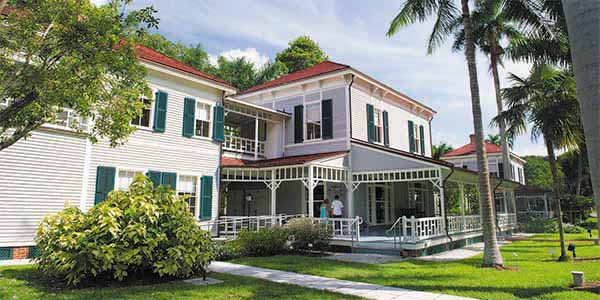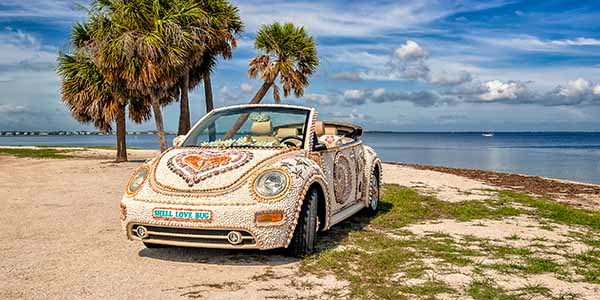Fort Myers
Fort Myers is an all-things-to-all-people destination. Encompassing a historic downtown, gorgeous beaches, waterways teeming with wildlife and recreational activities of every ilk, active families and nature lovers will never run out of things to do. History buffs will marvel at the Thomas A. Edison and Henry Ford Winter Estates, adjoining attractions that take visitors back in time.
Fathers of Invention
Fort Myers’ lively downtown is sprinkled with an array of cultural attractions, museums and historic landmarks. In particular, the Edison and Ford Winter Estates on the town’s west side are a pair of national treasures. The attraction showcases in detail the incredible accomplishments of Florida’s greatest snowbirds: Henry Ford, who revolutionized the automotive industry, and Thomas Edison, inventor and father of the light bulb. Tours lead visitors through nine historic buildings and 20 acres of botanical gardens (including one of the biggest banyan trees in the world). Edison’s Fort Myers Museum exhibits a selection of the 1,093 inventions that Edison would patent.

FortMyers-Sanibel.com
Indigenous Florida
The Southwest Florida Museum of History spotlights Native American culture, military history, regional fishing industries and the impact of Spanish explorers and early settlers. Part of the same complex, the Imaginarium Science Center features 60 interactive exhibits that incorporate STEM concepts, including an interactive jaunt through the history of Southwest Florida and marine life encounters with turtles, a ball python, a bearded dragon and prairie dogs.
City of Palms
With seven miles of white sand beach and inviting blue waters, Fort Myers’ beach is the city’s main calling card. For active families, there’s swimming, volleyball, kayaking and paddleboarding. Solitude seekers can play castaway on unspoiled barrier islands. Get to the “City of Palms” via the pedestrian friendly McGregor Boulevard, which forms the city’s iconic gateway. The thoroughfare is lined with soaring palm trees, historic buildings, diverse restaurants and eclectic boutiques. Bustling Times Square, the nexus of tourist activity, unfurls to a lively fishing pier and gulf-side restaurants serving some of the nation’s finest fish and seafood.
Into the Wild
A half- or full-day exploration to the Everglades is one of Fort Myers’ signature pastimes. From airboat rides to kayaking tours and guided walking tours, experiencing the rich array of flora and fauna that thrive within America’s largest subtropical ecosystem is an unforgettable experience. Outfitters in Fort Myers also offer nature cruises of pristine Estero Bay, a state aquatic preserve that provides sanctuary to myriad bird species as well as manatees and dolphins.
Manatee Mania
Tourists flock to Manatee Island, just seven miles north, to catch a glimpse of Florida’s endearing manatees, which can be viewed from three observation decks. From November to March, these cuddly sea cows seek refuge in these warm waters. At the visitor center, kayak and canoe rentals can be arranged for close encounters with Florida’s poster-child marine mammal. North Shore Park, along the Caloosahatchee River, is a tranquil tranche of Old Florida with a fishing pier and a kayak launch.

Matt Steeves Photography
Island Fling
Just south of Fort Myers’ beach, Lovers Key’s gorgeous two-mile beach, lapped by gentle waters, offers swimming, fishing and wildlife watching along scenic waterways populated with manatees and bottlenose dolphins. Captiva Island, with its technicolor sunsets, is one of the nation’s most romantic beaches, while Sanibel Island goes by the moniker of the “Shelling Capital of the World” for its incredible shoals of colorful shells. With over half the island designated a wildlife refuge, Sanibel offers 25 miles of scenic, accessible bike paths that wend through subtropical hammocks and preserved wetlands.
Hiking on the Coast
At Prairie Pines Preserve, 10 miles north of the city, there are novice hiking trails as well as prime bird-watching, geocaching, fishing and horseback riding. At the heart of Fort Myers’ River District, the small Butterfly Estates is an enchanting place to stroll amidst exotic Zen gardens, a koi pond, waterfalls and a showpiece glass butterfly conservatory, which is home to hundreds of native butterflies.
Light Fantastic
Fort Myers triumphs its connection to Thomas Edison at every turn. On February 11th, the Edison Festival of Light features two weeks of events, including a parade, street dances, a coronation ball, fishing competitions and the Grand Parade of Light. In March, on Estero Island, the two-day Fort Myers Beach Shrimp Festival celebrates Fort Myers’ status as home to the nation’s largest shrimp boat fleet with shrimp dinner bonanzas and a two-mile parade.
Native Soul
Before Spanish and Cuban settlers created temporary fishing and farming camps along the Gulf coast, Ponce de León navigated these wild and untamed shores in 1513 and 1521. For a glimpse into Fort Myer’s Native American history, it’s worth a trip to Pine Island, one of Florida’s most authentic and picturesque fishing villages. Visitors can take an illluminating guided tour of the Calusa Heritage Trail, where a Calusa archaeological site sits atop a 2,000-year-old shell mound. By 1885, Fort Myers had become the second-largest town on Florida’s Gulf Coast, but it was the arrival of Thomas Edison, who built his home and laboratory, Seminole Lodge, on the banks of the Caloosatchee River, that would put Fort Myers on the map. Twenty years later, entrepreneur Ohioan Ambrose McGregor transformed the dirt trail that is now McGregor Boulevard into a grand promenade, a visionary feat that would prove seminal to Florida’s development as a thriving tourist destination.
For More Information
The Beaches of Fort Myers and Sanibel
800-237-6444
www.fortmyers-sanibel.com
Florida Tourism
888-735-2872
www.visitflorida.com






